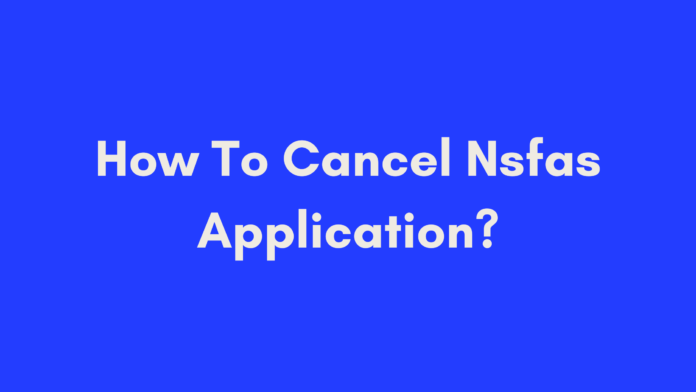Quick Summary
Are you looking to cancel your NSFAS application? This guide provides a clear and comprehensive overview of the cancellation process. You’ll find step-by-step instructions on how to cancel your application, reasons why you might consider doing so, and important considerations to keep in mind. Additionally, we cover how to get in touch with the NSFAS support center for further assistance. Whether you’ve secured other funding or decided not to continue your studies, this guide will help you navigate the cancellation process smoothly.
Introduction
Canceling an NSFAS (National Student Financial Aid Scheme) application can be a crucial step for various reasons. Whether you’ve found alternative funding sources or decided to postpone your studies, understanding how to effectively cancel your NSFAS application is essential. In this guide, we’ll walk you through the entire process, ensuring you have all the information you need to make an informed decision.
NSFAS offers financial aid to students who need assistance with their educational expenses. However, life can be unpredictable, and situations may change after you’ve submitted your application. Before diving into the cancellation process, it’s important to be aware of the reasons why you might need to cancel and what this entails.
Once you cancel your application, it cannot be reversed. If you later decide to pursue financial assistance from NSFAS again, you’ll need to submit a new application. This guide will help you navigate the cancellation process smoothly and address any common questions or concerns.
Reasons to Cancel Your NSFAS Application
There are several reasons why you might choose to cancel your NSFAS application. Understanding these reasons can help you make an informed decision about whether to proceed with the cancellation.
Securing Funding from Another Source
One of the most common reasons for canceling an NSFAS application is securing financial aid from another source. This could include:
- Scholarships: Awards given by educational institutions, private organizations, or government bodies to cover tuition and other expenses.
- Bursaries: Financial support provided by companies or foundations, often in exchange for a commitment to work for the organization after graduation.
- Grants: Funds provided by various entities that do not require repayment, often aimed at specific groups or fields of study.
If you’ve been awarded a scholarship, bursary, or grant, it might be unnecessary to keep your NSFAS application active. By canceling your NSFAS application, you’re allowing the funds to be redirected to other students who might need them more.
Deciding Not to Pursue Further Studies
Sometimes, personal circumstances change, leading you to reconsider your plans for higher education. Common reasons for this decision include:
- Health Issues: Personal or family health problems that require you to take a break from your studies.
- Family Responsibilities: Increased responsibilities at home that make it difficult to continue your education at this time.
- Career Changes: A shift in career goals that makes pursuing higher education less relevant or necessary.
If you decide to pause or forgo your studies temporarily or permanently, canceling your NSFAS application is a responsible step. It ensures that your application doesn’t occupy a spot that could benefit another student in need of financial assistance.
Conclusion
Canceling an NSFAS application is a significant decision that should be made with careful consideration of your current and future circumstances. Whether you’ve secured other funding or decided to alter your educational path, understanding the reasons for cancellation helps ensure that you’re making the best choice for your situation.
Feel free to reach out to the NSFAS support center if you need guidance on the cancellation process or have any concerns about how this decision might affect your future applications.

Step-by-Step Guide to Canceling an NSFAS Application
Canceling your NSFAS application is a straightforward process when you follow the correct steps. This guide will walk you through each step to ensure you complete the cancellation process efficiently.
1. Visit the Official NSFAS Website
To begin the cancellation process, you’ll need to access the NSFAS website. Follow these steps:
- Open your Web Browser: Use any web browser like Chrome, Firefox, or Safari.
- Navigate to the NSFAS Website: Enter the official URL in your address bar: NSFAS Official Website.
2. Log in to the Applicant Portal
Once on the NSFAS website, you’ll need to log in to your applicant account:
- Locate the Login Button: Find and click on the “Applicant Login” or similar button on the homepage.
- Enter Your Credentials: Input your username (or email address) and password to access your account. If you’ve forgotten your login details, use the “Forgot Password” link to reset them.
3. Navigate to the “My Applications” Section
After logging in, you’ll need to find your application details:
- Go to the Dashboard: Once logged in, you should be directed to your applicant dashboard.
- Find “My Applications”: Look for a section or tab labeled “My Applications” or similar.
4. Select the Application to Cancel
Within the “My Applications” section, you will see a list of your submitted applications:
- Identify the Correct Application: Review the list and select the application you wish to cancel.
- Click on the Application: Click on the application to view its details.
5. Click on the Cancel Option
To initiate the cancellation process:
- Locate the Cancel Button: Look for an option or button labeled “Cancel Application” or something similar.
- Select the Cancel Option: Click on this button to start the cancellation procedure.
6. Follow Additional Prompts or Instructions
After selecting the cancel option:
- Confirm Cancellation: You may be prompted to confirm your decision. Read any prompts carefully and provide a reason for your cancellation if required.
- Complete the Process: Follow any additional instructions provided on the screen. This may include verifying your decision or submitting a confirmation form.
7. Check for Confirmation
Once you’ve completed the cancellation steps:
- Review Confirmation Message: Ensure you receive a confirmation message or email that indicates your application has been successfully canceled.
- Save Confirmation Details: Keep a copy of the confirmation for your records, in case you need it for future reference.
Important Notes
- Irreversibility: Remember that once you cancel your application, it cannot be undone. If you decide to apply again in the future, you will need to submit a new application.
- Timing: Cancel your application well in advance of any deadlines or important dates to ensure it is processed without issues.
Troubleshooting
If you encounter any problems during the cancellation process:
- Check the FAQ Section: The NSFAS website may have a Frequently Asked Questions section that can help with common issues.
- Contact NSFAS Support: Reach out to the NSFAS support center using the contact methods listed below if you need further assistance.
Contact NSFAS Support Center:
- Phone: Call 08000 67327 (08h30 – 17h00 on weekdays)
- Email: Send inquiries to [email protected]
- Online Enquiry Form: Visit the NSFAS Contact Us Page and fill out the online enquiry form.
By following these steps, you can successfully cancel your NSFAS application. If you have any questions or need further assistance, don’t hesitate to reach out to NSFAS support.

Important Considerations Before Cancelling Your NSFAS Application
Before you proceed with canceling your NSFAS application, it’s essential to consider a few critical factors to ensure you’re making an informed decision. Here’s what you need to know:
1. Irreversibility
Once you cancel your NSFAS application, the action is final:
- Cannot Be Undone: If you decide to apply again in the future, you will need to start a new application from scratch. There’s no way to reverse or reinstate a canceled application.
- Plan Carefully: Ensure that canceling aligns with your current educational and financial plans before making a decision.
2. Reapplication Process
If you need to apply again after cancellation:
- Submit a New Application: You’ll have to go through the entire application process again, including resubmitting all required documents.
- Stay Updated on Deadlines: Keep track of application deadlines and ensure you meet all requirements for the new application cycle.
3. Timing of Cancellation
The timing of your cancellation can impact your academic plans:
- Consider Upcoming Deadlines: Ensure that your cancellation doesn’t interfere with any deadlines for financial aid or academic enrollment.
- Future Needs: Think about whether you might need NSFAS funding later and whether it’s worth canceling now.
4. Support Center Assistance
If you have any doubts or need further assistance:
- Contact NSFAS Support: If you’re unsure about the cancellation process or need help, reaching out to NSFAS support can provide clarity and ensure that your cancellation is handled correctly.
- Document Your Communication: Keep records of any communication with NSFAS support for future reference.
Contacting NSFAS Support Center
If you need assistance with the cancellation process or have questions, the NSFAS support center is available to help:
1. Phone Support
- Toll-Free Number: Call 08000 67327.
- Operating Hours: Weekdays from 08h30 – 17h00.
2. Email Support
- Email Address: Send your inquiries to [email protected].
3. Online Enquiry Form
- Website: Visit NSFAS Contact Us Page.
- Submit a Query: Fill out the online enquiry form to get in touch with the support team.
Tip: When contacting support, provide all relevant details about your application and cancellation request to ensure efficient assistance.
Conclusion
Cancelling your NSFAS application is a significant decision that requires careful consideration. By understanding the process, considering the implications of your cancellation, and knowing how to get support, you can ensure that you make the best choice for your educational and financial needs.
If you’re contemplating cancellation, weigh all factors, stay informed about the procedures, and seek assistance if needed. Remember, once your application is canceled, it cannot be reversed, so ensure you’re confident in your decision before proceeding.
References
- NSFAS Official Website
- Careers Portal – How to Cancel Your NSFAS Application
- Apply NSFAS – How to Cancel NSFAS Application
Frequently Asked Questions
When it comes to canceling your NSFAS application, you might have several questions. Here are some of the most common concerns and their answers to help you navigate the process:
1. What happens if I cancel my NSFAS application?
When you cancel your NSFAS application:
- Withdrawal of Financial Aid: You withdraw your request for financial assistance from NSFAS. This means you will no longer be considered for funding under this application.
- Impact on Your Studies: If you cancel, you’ll need to find alternative funding if you still plan to pursue your studies. Make sure you have a backup plan in place.
2. Can I reapply after canceling my NSFAS application?
Yes, you can reapply:
- Submit a New Application: After cancellation, you can apply again for NSFAS funding. However, you must go through the full application process and meet all current requirements.
- No Reinstatement: Once canceled, an application cannot be reinstated, so you will need to start a new application from scratch during the next application cycle.
3. How long does it take to process a cancellation request?
Processing times for cancellation requests may vary:
- Typical Timeframe: While NSFAS does not specify exact processing times, cancellations are generally processed within a few days to a few weeks.
- Check Status: Monitor your NSFAS portal or contact their support center to track the status of your cancellation request.
4. Can I cancel my application after the deadline?
Cancelling after the deadline can be tricky:
- Potential Issues: Attempting to cancel after the application deadline might result in complications, such as disqualification or ineligibility for future funding.
- Exceptions: In some cases, exceptions might be made due to extenuating circumstances. Contact NSFAS directly to discuss your situation if you need to cancel after the deadline.
5. What if I change my mind after canceling my application?
Changing your mind post-cancellation has limitations:
- Irreversibility: Once an application is canceled, it cannot be reversed. If you decide you still need funding, you will have to submit a new application during the next cycle.
- Reapplication: Ensure you are ready to reapply if needed, and be aware of all deadlines and requirements for the new application.
If you have more questions or need clarification on any point, don’t hesitate to contact NSFAS support or review the official NSFAS resources available online.
Source: NSFAS
Author’s Note
Navigating the world of financial aid and application processes can be complex, and deciding to cancel your NSFAS application is a significant decision. From personal experience, I understand how overwhelming these processes can be. My goal with this guide is to provide clear, actionable information to help you make informed decisions about your NSFAS application.
If you’re considering canceling your application, I hope this guide has provided you with a comprehensive overview of the steps involved, the considerations you need to keep in mind, and the resources available to you. It’s always essential to weigh your options carefully and ensure that any decision aligns with your academic and financial goals.
Remember, while the cancellation process might seem daunting, you’re not alone. Many students face similar decisions and challenges. Should you need further assistance, don’t hesitate to reach out to the NSFAS support center or explore additional resources on their website.
Thank you for taking the time to read this guide. I wish you all the best in your academic journey and financial planning.
Feel free to share your thoughts or ask questions if you need more assistance. Your feedback is valuable and helps in creating content that truly addresses your needs.

Oliver is a full-time writer with a passion for creating compelling content on diverse topics, including finance, business, product reviews, and more. With a keen eye for detail and a commitment to thorough research, she brings clarity and depth to complex subjects, making them accessible and engaging for readers. Oliver’s dedication to her craft ensures that every article is informative, well-researched, and thought-provoking. Outside of writing, she enjoys exploring new ideas, reading extensively, and continually expanding her knowledge.
Editorial Process
At Trusted Sources, our editorial process is crafted to ensure that every piece of content we produce—whether it’s an informational article or a review—meets the highest standards of accuracy, reliability, and engagement. Our commitment to delivering valuable, research-driven, and reader-centric content is reflected in our systematic and meticulous editorial approach.
Affiliate Disclosure
we are committed to transparency and honesty in all aspects of our operations, including our affiliate partnerships. We participate in various affiliate programs, which means we may earn commissions on qualifying purchases made through links on our Website.


